|
|
|
Sort Order |
|
|
|
Items / Page
|
|
|
|
|
|
|
| Srl | Item |
| 1 |
ID:
072958
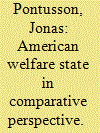

|
|
|
|
|
| Publication |
2006.
|
| Summary/Abstract |
Alberto Alesina and Edward Glaeser's recent book, Fighting Poverty in the US and Europe, exemplifies the recent incursion of economists into the domains of political science and sociology. In thinking about welfare states, economists have traditionally been interested in their effects on the distribution of income and, above all, their implications for efficiency and growth. Alesina and Glaeser instead set out to explain why "Americans are much less willing to redistribute from the rich to the poor than Europeans" (2) or, in other words, why the American welfare state is so small by comparison to European welfare states. This, then, is a book about American exceptionalism in the realm of social policy, but Alesina and Glaeser's discussion also addresses the general problem of accounting for cross-national variation in the public provision of social welfare. Their project is to provide an account of the exceptional nature of the American welfare state that is consistent with and sheds light on differences among other welfare states as well. This makes for an audacious book that deserves critical scrutiny.
|
|
|
|
|
|
|
|
|
|
|
|
|
|
|
|
| 2 |
ID:
025659


|
|
|
|
|
| Publication |
London, macmillan Press, 1982.
|
| Description |
xiv, 218p.
|
| Standard Number |
0333335422
|
|
|
|
|
|
|
|
|
|
|
|
Copies: C:1/I:0,R:0,Q:0
Circulation
| Accession# | Call# | Current Location | Status | Policy | Location |
| 029981 | 355.0335/HAR 029981 | Main | On Shelf | General | |
|
|
|
|
| 3 |
ID:
123776
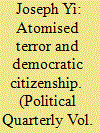

|
|
|
|
|
| Publication |
2013.
|
| Summary/Abstract |
This essay connects the 2103 Boston Bombings to the dynamics of a highly individualist, modern society. The perpetrators (Tsarnaev brothers) represent an atomized stratum of Americans, disconnected from communal institutions and organizations; socially insignificant men, ready to commit publicized, albeit isolated, acts of violence. With the exception of the World Trade Center, major terrorist attacks in the past two decades have been perpetrated by asocial, isolated individuals. An expansive security and welfare state is an inadequate response to atomized terror and is potentially problematic for our liberties. An approach more consistent with security and freedom is to nurture the rights and responsibilities of democratic citizenship.
|
|
|
|
|
|
|
|
|
|
|
|
|
|
|
|
| 4 |
ID:
171702
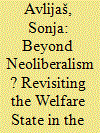

|
|
|
|
|
| Summary/Abstract |
Scholars of political economy have criticised the Baltic states’ transition to capitalism as socially ‘disembedded’ and shaped by a zealous form of neoliberalism. This article argues that the Baltic welfare states have experienced a more complex post-socialist transformation than suggested by the ‘neoliberal retrenchment’ narrative, which relies on the traditional definition of the welfare state and focuses solely on cash compensation for the ‘losers’ of transition. By uncovering higher investment in education, more generous labour market policies and a larger expansion of public sector employment than in the Visegrád countries, the article uncovers social investment oriented welfare states in the Baltic.
|
|
|
|
|
|
|
|
|
|
|
|
|
|
|
|
| 5 |
ID:
117485
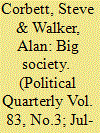

|
|
|
|
|
| Publication |
2012.
|
| Summary/Abstract |
This article contributes to the steady flow of critiques of the big society idea contained in The Political Quarterly. It focuses chiefly on two sets of parallels. The first is between the big society and the policies pursued by the Thatcher government which, despite their obvious rhetorical differences, contain many striking similarities, including their neoliberal origins, application of the 'crowding out' thesis and uncritically idealised notions of community. The second is between the big society and a policy with the same name pursued doggedly by the Chinese Communist Party for nearly 20 years until being abandoned as a failure. Lessons for the Prime Minister's flagship policy are drawn from the Chinese experience. The article concludes with a welcome for the rediscovery of the social by public policy and some suggestions as to how a more participative and democratic state could follow from this breakthrough.
|
|
|
|
|
|
|
|
|
|
|
|
|
|
|
|
| 6 |
ID:
110871


|
|
|
|
|
| Publication |
2012.
|
| Summary/Abstract |
Old-age income protection is provided in wealthy democracies by publicly funded defined-benefit pensions. Budgetary challenges have forced policy makers to consider private alternatives to these traditional systems. I consider the shortcomings of private saving arrangements in duplicating the advantages of public pensions. Some shortcomings can be overcome by introducing compulsory elements into private saving plans. Worker contributions into such plans could be mandatory; some or all worker accumulations in the plans could be converted to annuities at retirement; and workers' investment choices could be narrowly circumscribed. These restrictions do not eliminate the biggest weakness of private saving plans. Fluctuations in asset prices make it hard even for well-informed savers to select an affordable saving rate and an investment strategy that will assure decent income in old age. Public pension systems partly insulate workers against economic and financial market risks by sharing those risks broadly across workers, retirees, and taxpayers in multiple generations.
|
|
|
|
|
|
|
|
|
|
|
|
|
|
|
|
| 7 |
ID:
096156
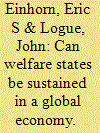

|
|
|
|
|
| Publication |
2010.
|
| Summary/Abstract |
Argue that the European social model can be reformed without sacrificing its gains and that the Scandinavian states have already adapted their welfare state models to meet demographic, social, and economic challenges. They sketch the characteristics of the Scandinavian model, including its underpinnings in encompassing organizations of the less well off, the role of democratic corporatism in policymaking, and the importance of empiricism, social trust, and solidarity in the development of public policy.
|
|
|
|
|
|
|
|
|
|
|
|
|
|
|
|
| 8 |
ID:
131145
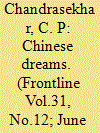

|
|
|
|
|
| Publication |
2014.
|
| Summary/Abstract |
Becoming another China is not easy as that will involve the reduction of expenditure on food subsidies and other welfare measures.
|
|
|
|
|
|
|
|
|
|
|
|
|
|
|
|
| 9 |
ID:
123771


|
|
|
| 10 |
ID:
087188
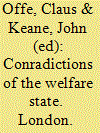

|
|
|
|
|
| Publication |
London, Hutchinson, 1984.
|
| Description |
310p.
|
| Standard Number |
091534305
|
|
|
|
|
|
|
|
|
|
|
|
Copies: C:1/I:0,R:0,Q:0
Circulation
| Accession# | Call# | Current Location | Status | Policy | Location |
| 025073 | 330.126/OFF 025073 | Main | On Shelf | General | |
|
|
|
|
| 11 |
ID:
110868
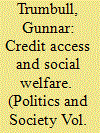

|
|
|
|
|
| Publication |
2012.
|
| Summary/Abstract |
Research into the causes of the 2008 financial crisis has drawn attention to a link between growing income inequality in the United States and high household indebtedness. Most accounts trace the U.S. idea of credit-as-welfare to the period of wage stagnation and welfare retrenchment that began in the early 1970s. Using France as a comparison case, I argue that the link between credit and welfare was not unique to the United States. Indeed, U.S. charitable lending institutions that emerged at the beginning of the twentieth century were modeled in part on older French financial institutions. Three historical factors drove U.S. lenders and policymakers to push for expanded credit access for the working class. First, welfare reformers in the interwar period embraced private credit as an alternative to an expansive welfare state. Second, U.S. organized labor in the wake of World War II embraced credit access as a means to sustain industrial employment and finance strike actions. Third, commercial banks in the 1950s began offering revolving credit accounts as a means to attract new depositors at a time when banking regulation restricted the interest they could offer on deposits.
|
|
|
|
|
|
|
|
|
|
|
|
|
|
|
|
| 12 |
ID:
140251
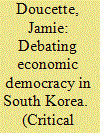

|
|
|
|
|
| Summary/Abstract |
In the 2012 Korean presidential election, both liberal and conservative parties fought their campaigns on the slogan of “economic democratization,” marking a strong departure from past presidential elections and the growth-first policies of the then-incumbent conservative administration. Both parties pledged to tackle growing social polarization and the concentration of economic power by reforming the corporate governance of Korea's large, family-led conglomerates (chaebol), to the degree that chaebol reform itself became synonymous with economic democratization. This focus led to a series of heated exchanges among liberal-left reformers about the vision of economic democratization being promoted, with one camp favoring the creation of a “fair market” through the restructuring of the chaebol and another promoting the protection of the chaebol’s management rights over their affiliates as a desirable strategy for the creation of a Korean welfare state. This essay examines the long-standing tensions between these two liberal-left perspectives and argues that the capital-centric and market-based visions these camps promoted risk confining intellectual debate over the meaning of economic democracy within boundaries that serve dominant political interests.
|
|
|
|
|
|
|
|
|
|
|
|
|
|
|
|
| 13 |
ID:
097825
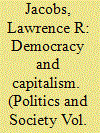

|
|
|
| 14 |
ID:
153806
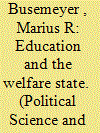

|
|
|
| 15 |
ID:
146634
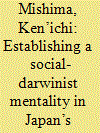

|
|
|
|
|
| Summary/Abstract |
From a historical perspective, the welfare net in Japan was established from above without democratic participation and expanded only slowly. This expansion in many cases was aimed at enhancing national cohesion, especially during war time. During the current neoliberal era, Japan’s paternalistic welfare state has been able to put into practice the dismantling of national pension and health-care systems without the need for any theoretical re-orientation. In response, counter-publics have engaged in protest and resistance. By doing so, the victims of modernization and those who are socially weak and disadvantaged in multiple ways are able to regain their self-esteem and personal integrity.
|
|
|
|
|
|
|
|
|
|
|
|
|
|
|
|
| 16 |
ID:
095030
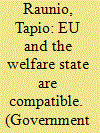

|
|
|
| 17 |
ID:
185632
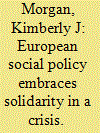

|
|
|
|
|
| Summary/Abstract |
Governments in Europe responded to the COVID-19 pandemic by expanding their welfare systems to protect health, jobs, and incomes. The varied initiatives embody the principle of solidarity and demonstrate how welfare programs serve as a form of collective insurance against risk. But the twin health and economic crises also exposed gaps in coverage for many, including migrants and gig economy workers. Fiscal austerity, enforced by the European Union, has long constrained efforts to close those gaps.
|
|
|
|
|
|
|
|
|
|
|
|
|
|
|
|
| 18 |
ID:
111906
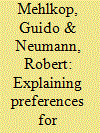

|
|
|
|
|
| Publication |
2012.
|
| Summary/Abstract |
Explanations of different patterns of preferences for redistribution either highlight the role of the institutional framework in a country or highlight the importance of self-interest and rational expectations. The study introduces a unified approach to explain differences in preferences for redistributive measures for the case of intergenerational monetary transfers for families and children. Both explanatory approaches are integrated into the action-based Model of Frame Selection that incorporates normative motives and economic self-interest into the process of decision making. Using a large sample that deals with questions on the approval of public policies for families and accounts for the normative importance of children and family life in Germany, evidence is provided that both approaches are valid in explaining preferences for government transfers.
|
|
|
|
|
|
|
|
|
|
|
|
|
|
|
|
| 19 |
ID:
134106
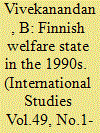

|
|
|
|
|
| Publication |
2014.
|
| Summary/Abstract |
Finland has an advanced welfare state system, which extends social protection for everyone in the country. The system is anchored in a full-employment policy, a steeply progressive taxation system, and a strong, benevolent and resourceful state, endowed with the authority to regulate the economic and social life of people. This system has been established through the institutionalization of various social insurance schemes and schemes for pensions, health care, childcare, free and compulsory education, etc. In the 1990s, the Finnish state experienced an economic crisis, borne out of flawed economic reforms like the deregulation of the financial market and other changes that aimed at hastening Finland's European Union (EU) membership. The crisis forced the government to tighten the preconditions for availing of welfare benefits. Some notable changes made during the crisis have not yet been rescinded even after it ended. Nevertheless, the crisis underlined the value of the welfare state system in helping ordinary people to successfully insulate themselves against any serious hardship during the period. As a result, the system is very popular in Finland. The Finnish welfare system today faces new challenges emanating from globalization, the EU, demographic changes and structural unemployment.
|
|
|
|
|
|
|
|
|
|
|
|
|
|
|
|
| 20 |
ID:
173997
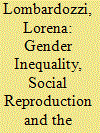

|
|
|
|
|
| Summary/Abstract |
Despite extensive attention being paid to the effects of the Universal Basic Income (UBI) on society at large, there has been little analysis on the relationship between gender inequality and UBI. The purpose of this article is first to reflect on the feminist arguments in favour of UBI and then to examine some of these points by also considering other available policies. By looking into the role of women’s work in both productive and reproductive activities, it is argued that UBI should not be disregarded as a social policy. However, its transformative capacity to empower women and to strengthen their role in society should not be overestimated. In order to address this gap, policy makers should address misconceptions around gender norms and acknowledge the multiple forms of women’s work across the social relations of production and reproduction.
|
|
|
|
|
|
|
|
|
|
|
|
|
|
|
|
|
|
|
|
|